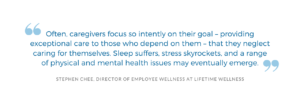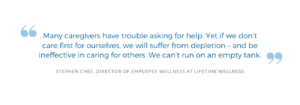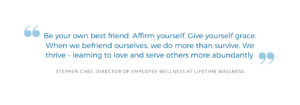With the ongoing global pandemic, caregivers – in professional health care settings and at home – are operating in overdrive.
“Caregivers strive each day to give it their all, but they’re at continuous risk of burnout and compassion fatigue,” says Stephen Chee, director of employee wellness at Lifetime Wellness. “The extra layer of concern posed by Covid-19 has magnified the risk of caregiver fatigue.

Chee recently presented on the topic of caregiver wellness at a virtual conference of the National Council on Aging. He offers these seven tips for overcoming caregiver fatigue:
1. Care first for yourself
Follow three simple principles for self-care:
- Receive, first; give, second.
- Do not put yourself last.
- Take time to rest, refuel, and recover.

2. Plan each day
An essential part of being an effective caregiver is careful planning. “Don’t leave your daily activities to chance,” Chee says. “Be proactive and methodical in creating your schedule.” He offers these steps:
- Choose your medium, either a planning notebook and pen or a digital calendar.
- Schedule a one-hour weekly planning session on a specific day and at a time most convenient for you.
- Block off time for each activity beyond caregiving.
- Be flexible and realistic, leaving room for unexpected events.
3. Trust your emotional intelligence
Chee advises drawing from an inner well of “emotional intelligence,” defined as a set of skills that influence self-perception and expression, social relationship building, stress navigation, and use of emotional information to make better decisions.
The Harvard Business Review offers an emotional intelligence assessment tool, based on five domains and competencies: self-awareness, positive outlook, self-control, adaptability, and empathy. To cultivate these qualities, Chee offers the following suggestions:
- Practice active listening to understand the intentions and preferences of others
- Communicate effectively with the goal of building trust and rapport
- Be mindful of the tempo of your thoughts and words; speak calmly
- Learn to be present to others, even while multi-tasking
- Monitor your tone and body language
- Keep up your motivation, guided by an abiding sense of purpose
- Be open – to feedback and new approaches to caregiving
“The key to sustaining emotional intelligence is empathy—the ability to deeply feel and share the experiences of others,” Chee says. “Empathy is needed not only in caring for others but also in loving and forgiving ourselves.”
Contact us today to learn how you can bring caregiver wellness programs to your facility!
4. Know your caregiver rights
For caregivers, the starting point for better self-care is “being honest about what you need,” Chee says. That includes:
- Taking time for yourself – it’s not selfish; it’s essential
- Knowing your capacity and learning to say no
- Managing your time in a way that works best for you
- Receiving compassion from others
- Asking for help
- Understanding which environments drain you and which ones restore you
- Balancing your “emotional load,” weighing energy input against energy output
5. Reach out
Build your personal network. Develop a trusted inner circle of confidants with whom you can openly share, from family members to close friends, co-workers and mentors to counselors and faith and support groups.
6. Recover and renew
“Restore your body; refresh your mind and spirit,” Chee advises. Steps for physical recovery range from mindful nutrition, hydration, and sleep to deep breathing, regular exercise/stretching, and rejuvenating therapeutic massage. Mental/emotional recovery activities include quiet time, creative expression, journaling, nature walks, and spiritual pursuits.
“Celebrate your caring heart. Find room for joy. Write down the things you are thankful for! Focus on the five activities that bring body, mind, and spirit into equilibrium: love, care, thanksgiving, compassion, and forgiveness.”

7. Be kind to your mind
The most effective mantra to surmount compassion fatigue? “Don’t be your own worst enemy,” Chee says. “Be your own best friend. Affirm yourself. Give yourself grace. When we befriend ourselves, we do more than survive. We thrive – learning to love and serve others more abundantly.”
Interested in learning more about how you can bring wellness to your community? Download our free caregiver wellness brochure to get started.